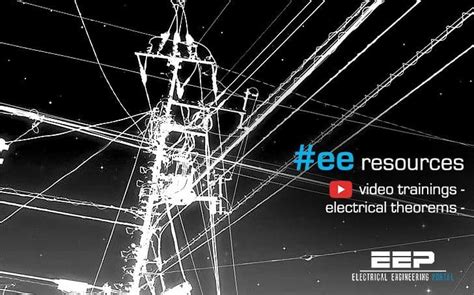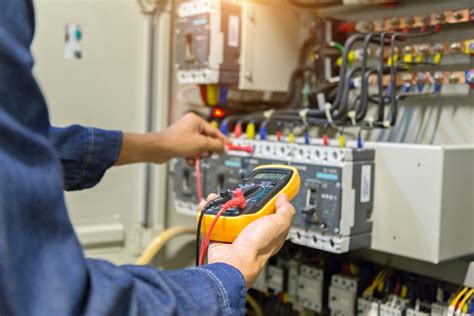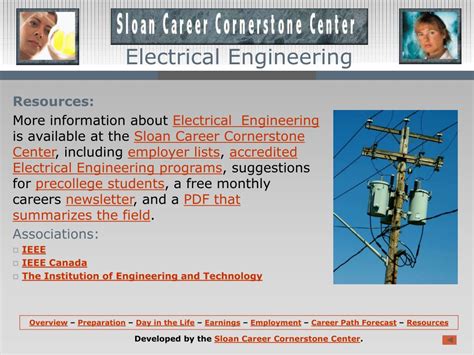Educational Resources
Online Courses and Tutorials
-
MIT OpenCourseWare (OCW) – Electrical Engineering: MIT OCW offers a wide range of free online courses in electrical engineering, covering topics such as circuits and electronics, signal processing, and more. (Link)
-
Coursera – Electrical Engineering Courses: Coursera partners with top universities to provide online courses in electrical engineering. Some popular courses include “Fundamentals of Electrical Engineering” and “Digital Signal Processing.” (Link)
-
edX – Electrical Engineering Courses: edX is another platform that offers online courses from leading universities. They have a variety of electrical engineering courses, such as “Circuits and Electronics” and “Embedded Systems.” (Link)
-
Khan Academy – Electrical Engineering: Khan Academy provides free online learning resources, including a section dedicated to electrical engineering. Topics covered include circuit analysis, amplifiers, and semiconductors. (Link)
-
All About Circuits – Tutorials: All About Circuits is a comprehensive resource for electrical engineers, offering tutorials on a wide range of topics, such as basic electricity, semiconductors, and digital circuits. (Link)
Textbooks and Reference Materials
-
The Art of Electronics by Paul Horowitz and Winfield Hill: This classic textbook covers the fundamentals of electronics, including circuit design, digital logic, and microprocessors. (Amazon Link)
-
Fundamentals of Electric Circuits by Charles K. Alexander and Matthew N.O. Sadiku: This textbook provides a thorough introduction to electric circuits, covering topics such as circuit analysis, operational amplifiers, and three-phase circuits. (Amazon Link)
-
Electrical Engineering 101: Everything You Should Have Learned in School…but Probably Didn’t by Darren Ashby: This book serves as a practical guide for electrical engineers, covering the basics of electrical engineering and providing real-world examples. (Amazon Link)
-
Practical Electronics for Inventors by Paul Scherz and Simon Monk: This book is an invaluable resource for inventors and hobbyists, providing practical information on electronics components, circuits, and tools. (Amazon Link)
-
The Electrical Engineering Handbook by Richard C. Dorf: This comprehensive handbook covers a wide range of topics in electrical engineering, making it an essential reference for professionals in the field. (Amazon Link)
Software Tools
Circuit Simulation and PCB Design
-
LTspice: LTspice is a free, high-performance SPICE simulator for analog circuits, provided by Linear Technology (now part of Analog Devices). It is widely used in the industry for circuit simulation and analysis. (Download Link)
-
PSPICE: PSPICE is a commercial SPICE simulator for analog and mixed-signal circuits, offered by Cadence. It is known for its accuracy and extensive model libraries. (Link)
-
EAGLE: EAGLE is a popular PCB design software, now owned by Autodesk. It offers schematic capture, PCB layout, and an extensive library of components. (Link)
-
KiCad: KiCad is a free, open-source PCB design software that includes schematic capture, PCB layout, and 3D viewer. It has gained popularity due to its active community and continuous improvements. (Link)
-
Altium Designer: Altium Designer is a professional PCB design software that offers a complete set of tools for schematic capture, PCB layout, and manufacturing output. It is known for its advanced features and ease of use. (Link)
Programming and Embedded Systems
-
MATLAB: MATLAB is a high-level programming language and numerical computing environment, widely used in electrical engineering for signal processing, control systems, and data analysis. (Link)
-
LabVIEW: LabVIEW is a graphical programming environment developed by National Instruments. It is commonly used for data acquisition, instrument control, and industrial automation. (Link)
-
Arduino IDE: Arduino IDE is an open-source software for programming Arduino microcontroller boards. It is beginner-friendly and has a large community of users and resources. (Link)
-
Raspberry Pi OS: Raspberry Pi OS (formerly Raspbian) is the official operating system for Raspberry Pi single-board computers. It is based on Debian Linux and optimized for the Raspberry Pi hardware. (Link)
-
Atmel Studio: Atmel Studio is an integrated development environment (IDE) for developing and debugging Atmel AVR and SAM microcontroller applications. It is now part of Microchip Studio. (Link)

Online Communities and Forums
Discussion Platforms
-
EEVblog Forum: The EEVblog forum is a popular online community for electrical engineers, hobbyists, and enthusiasts. It covers a wide range of topics, including electronics design, tools, and projects. (Link)
-
All About Circuits Forum: The All About Circuits forum is a community where electrical engineers and enthusiasts can discuss various topics related to electronics, from beginner questions to advanced design challenges. (Link)
-
Electrical Engineering Stack Exchange: Electrical Engineering Stack Exchange is a question and answer site for professionals and students of electrical engineering. It is part of the Stack Exchange network. (Link)
-
Reddit – /r/ElectricalEngineering: The /r/ElectricalEngineering subreddit is a community for discussion and sharing of information related to electrical engineering, including news, projects, and career advice. (Link)
-
Engineering.com – Electrical Engineering Forum: Engineering.com hosts a forum dedicated to electrical engineering, where professionals and enthusiasts can discuss various topics and seek advice from the community. (Link)
Blogs and Websites
-
Hackaday: Hackaday is a popular blog featuring innovative projects, hacks, and news related to electrical engineering and electronics. It is a great source of inspiration and learning. (Link)
-
Adafruit Industries Blog: Adafruit Industries is a company that designs and sells open-source hardware and electronics. Their blog features tutorials, projects, and news related to electrical engineering and maker culture. (Link)
-
SparkFun Electronics Blog: SparkFun Electronics is another company that sells open-source hardware and electronics. Their blog features tutorials, projects, and insights into the world of electrical engineering. (Link)
-
Instructables – Circuits Category: Instructables is a website where users can share and explore DIY projects. The Circuits category features a wide range of electrical engineering projects, from beginner to advanced levels. (Link)
-
ElectronicDesign.com: ElectronicDesign.com is a website that provides news, articles, and resources for electrical engineers. It covers a wide range of topics, including analog and digital design, power management, and more. (Link)

Professional Organizations and Conferences
Organizations
-
IEEE (Institute of Electrical and Electronics Engineers): IEEE is the world’s largest technical professional organization dedicated to advancing technology for the benefit of humanity. It has a strong focus on electrical engineering and offers numerous resources, publications, and events. (Link)
-
IET (Institution of Engineering and Technology): IET is a multidisciplinary professional engineering institution based in the United Kingdom. It provides a wide range of resources and events for electrical engineers, including publications, training, and networking opportunities. (Link)
-
NEMA (National Electrical Manufacturers Association): NEMA is a trade association representing electrical equipment and medical imaging manufacturers in the United States. It develops standards, provides advocacy, and offers resources for the electrical manufacturing industry. (Link)
-
IEEJ (Institute of Electrical Engineers of Japan): IEEJ is a professional organization for electrical engineers in Japan. It promotes the advancement of electrical engineering through research, education, and collaboration. (Link)
-
VDE (Verband der Elektrotechnik, Elektronik und Informationstechnik): VDE is a German professional organization for electrical, electronic, and information technologies. It develops standards, certifies products, and offers training and events for electrical engineers. (Link)
Conferences
-
IEEE International Conference on Electrical Engineering (ICEE): ICEE is an annual conference that covers a wide range of topics in electrical engineering, including power systems, electronics, and telecommunications. (Link)
-
IEEE Power & Energy Society General Meeting (PES GM): The IEEE PES GM is an annual conference focusing on power systems, energy conversion, and related topics. It brings together researchers, practitioners, and industry leaders from around the world. (Link)
-
IEEE Applied Power Electronics Conference (APEC): APEC is an annual conference dedicated to applied power electronics, covering topics such as power conversion, energy storage, and motor drives. (Link)
-
IEEE Wireless Power Transfer Conference (WPTC): WPTC is an annual conference focusing on wireless power transfer technologies, including inductive, capacitive, and far-field methods. (Link)
-
IEEE International Symposium on Circuits and Systems (ISCAS): ISCAS is an annual conference covering a wide range of topics in circuits and systems, including analog and digital circuits, signal processing, and emerging technologies. (Link)

Journals and Publications
Peer-Reviewed Journals
-
IEEE Transactions on Electrical Engineering: This journal covers fundamental theory, applications, and practical implementations of electrical engineering principles. (Link)
-
IEEE Journal of Emerging and Selected Topics in Power Electronics: This journal focuses on emerging and selected topics in power electronics, including advanced materials, control techniques, and applications. (Link)
-
IEEE Transactions on Industrial Electronics: This journal covers the theory and applications of industrial electronics, including power electronics, control systems, and automation. (Link)
-
IET Power Electronics: This journal covers the design, analysis, and application of power electronic circuits and systems. (Link)
-
IEEJ Transactions on Electrical and Electronic Engineering: This journal covers a wide range of topics in electrical and electronic engineering, with a focus on research and development in Japan and Asia. (Link)
Magazines and Trade Publications
-
IEEE Spectrum: IEEE Spectrum is a monthly magazine that covers a wide range of topics in electrical engineering, including technology news, trends, and insights. (Link)
-
Power Electronics Magazine: Power Electronics Magazine is a bi-monthly publication that covers the latest developments in power electronics, including design techniques, applications, and market trends. (Link)
-
Electrical Contractor Magazine: Electrical Contractor Magazine is a monthly publication that covers news, trends, and best practices for electrical contractors and professionals in the electrical construction industry. (Link)
-
Electronic Design Magazine: Electronic Design Magazine is a monthly publication that covers the latest trends, technologies, and design techniques in electronic engineering. (Link)
-
Charged – Electric Vehicles Magazine: Charged is a bi-monthly magazine that focuses on the rapidly growing electric vehicle industry, covering topics such as battery technology, charging infrastructure, and EV market trends. (Link)
Frequently Asked Questions (FAQ)
1. What are the most important skills for an electrical engineer to have?
Some of the most important skills for an electrical engineer include:
– Strong understanding of electrical and electronic principles
– Proficiency in circuit design and analysis
– Knowledge of programming languages and embedded systems
– Problem-solving and critical thinking abilities
– Attention to detail and ability to work in a team
2. What are some of the best entry-level jobs for electrical engineers?
Some popular entry-level jobs for electrical engineers include:
– Electrical Design Engineer
– Test Engineer
– Field Service Engineer
– Sales Engineer
– Embedded Software Engineer
3. How can I stay up-to-date with the latest developments in electrical engineering?
To stay current with the latest developments in electrical engineering, you can:
– Attend conferences and workshops
– Join professional organizations and participate in their events
– Read peer-reviewed journals and trade publications
– Follow industry blogs and websites
– Engage in online communities and forums
4. What are some of the most promising areas of research in electrical engineering?
Some of the most promising areas of research in electrical engineering include:
– Renewable energy and smart grid technologies
– Artificial intelligence and machine learning applications
– 5G and beyond wireless communication systems
– Internet of Things (IoT) and connected devices
– Advanced robotics and automation
5. How important is practical experience for electrical engineers?
Practical experience is crucial for electrical engineers, as it allows them to apply theoretical knowledge to real-world problems, develop problem-solving skills, and gain hands-on experience with tools and equipment. Internships, co-op programs, and personal projects are excellent ways to gain practical experience while studying or early in one’s career.
By leveraging these top 50 resources, electrical engineers can enhance their knowledge, skills, and professional network, ultimately leading to a successful and rewarding career in this exciting field.

No responses yet